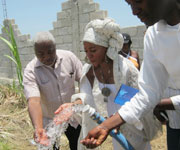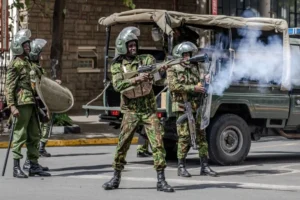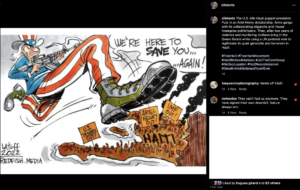What is Needed
by JOSEPH G. RAMSEY
Campside (based on true events)
1.
In Haiti
there is money to build
walls
not to house
the poor
but to block them
from view;
to lay brick
high and thick,
not to protect
the homeless
from the elements,
but to protect
the rich man’s twenty-acre
estate
from the sewage that flows
downhill
from the camp
when it rains.
And so now
when it rains
A human stew
Bubbles backs from the base of the wall
into the camp”
deep enough to drown in
A gathering cesspool
for mosquitos
to breed
and cholera
to bloom.
2.
The construction project
Gives at least
a few men
”from another camp across town”
work:
hard, back-breaking work
for a few weeks
At almost three times the minimum wage
Of a dollar a day.
The wall at least
gives
the mosquitos
a home.
These fiends thrive,
Lay their eggs in the stagnant water
Feeding by night
on what flesh they can puncture.
Each little blood-sucker’s life
is short.
They live for only a few weeks
Before they drop somewhere
Dead
In some unmarked speck grave”that is
if they aren”t caught first
Between the finger and the thumb”
They burst like tiny rotten berries.
Yes, any single
mosquito can be easily dealt with.
Once you know where exactly its buzz
Comes from.
Splat.
But in their uncountable numbers,
an invisible, everywhere swarm
They appear utterly
unvanquishable.
You go mad at night
just swatting the sound of them .
Praying through razed blisters
for someone
to drain this godforsaken swamp
of a world.
3.
Across the street, Food for the Poor (that’s their name)
Tells a delegation from the camp (they’re next door neighbors)
that they cannot help them;
That this is a not a distribution center;
That FFP’s funds go elsewhere
And that, besides, they wouldn”t want to start trouble by
giving food (or mosquito netting)
to people
Just like that,
Without, you know, going through all the proper channels.
Without armed guards present
to keep order
and paid clerks on hand
to track everything on official charts and checklists:
how many grains of how much rice went to whom and to where and what color it was, and who said please and who thank you (and who did not).
I mean, if distributing food to the poor was as easy as, you know, just
Givingfoodtopoorpeoplewhosaytheyarehungry
andwhohavetheribsandcollarbonestoproveit
then, well,
You wouldn”t even need professional organizations like
Food for the Poor
in the first place,
would you?
4.
A world away
Far beyond even the locked gates of Charity
Elsewhere
Where “History” is made
A UN official
gets promoted
to stand behind a podium and
speak of “A risk of a pandemic” and
“A surge in infant mortality.”
Earnest euphemism
Rolls off that juicy pink tongue;
(The fluent official gargles water
Before coming on stage
with another bottle of Aquafina at the podium
Just in case
the throat suddenly dries up;
It can get awfully hot up there,
Under all those bright lights,
With all the world watching.)
5.
Meanwhile
In the dark
cholera stretches it limbs across prison floors
From steel barred windows to crack-webbed walls
Where profane protests against the state
are smeared in feces
and blood.
Some walls still won”t fall.
As others go up.
And more are planned.
*
Tons upon tons of construction materials
Sit piled at camp-side:
Metal beams like the stacked legs of starved giants,
Head-high mounds of sand and crushed granite, rubble
Fresh-shoveled and trucked
from the wreckage of Port-au-Prince.
(There’s a fortune being made in the sale of rubble.)
Monster machines sit idle. Watched over by armed guards.
And a handful of hired workers stand and smoke, idle too,
waiting to break ground, at the boss’s order.
Their muscles itch for work.
There are building materials here
for a hundred homes, at least.
Only,
Not.
The squatters are to be
Evicted
from their road-side camp
By the rightful land owner
With the official stamp.
He wants to build a factory
He needs to build a factory
”there is money for a factory”
obligations to meet
words to keep
(The owners, too, imprisoned, by what they must build
Though their jail-cells are air-conditioned,
And fur coats keep off the chill.)
There’s a signed contract with a foreign company
to produce: baseballs
to be exported and sold to Sporting Goods stores
who will sell them at a mark-up
to the parents of little American boys and girls
who have fields to play in
and who can afford to lose things
in streams and under fences
and buy new ones.
6.
Campside
Hundreds of people contemplate
Scraping up the will
to struggle together, to keep their grip
on a cracked plot of ground that they never asked for
In the first place;
That was forced upon them:
A sun-baked tarp town
where they have been confined for more than a year now,
without schools or sanitation,
While the rulers make plans
That do not include them
Except as sources of
excrement
To be sealed off
Or else
as cheap labor
to be mixed
with the bricks
that wall people
in
and people
out.
*
The bulldozers rumble
The manager shouts
“If there’s no trouble, if you all move out,
Some of you may get the chance to sew baseballs.
You like baseballs, don’t you?”
The new boss promises two dollars a day.
A few will be hired”the rest flushed
away.
7.
Will the refuse of this system pick this city
of sheets and boiling shade
Of ghosts and newborns and grandparents
and toys
But no safe place to play and
Of grime and sand
and whispered songs
And blanched rebel memories
To make their stand?
The stagnant waste water by the wall
rises.
Do they think they can?
Or will the machetes and machine guns
scatter them in the night
(As they have done before)
Leaving them in the ditch
Dreaming of clean streams,
a plot of land,
And a world
That’s been flushed
of walls
and the
rich?
8.
A rash spreads across the old woman’s legs
What can she do?
But bang her two pots together at half past noon
with the others,
(a daily demonstration)
that, and be ready to place her body between her grand-child
and the bulldozer, when they come:
She’s lost her shop, and her sewing machine.
Used to sew clothes for people in the city,
To patch the garments of those who could not afford to buy new.
(She had been one of the luckier few.)
There is plenty here that needs stitching.
By hand, she does what she can do.
sews rags into a quilt,
keeps a sole
on a shoe.
(Plenty that needs tearing down, here, too.)
*
A baby lies asleep on the bed,
a mosquito net dome, laid over his head.
Those elsewhere who can afford it use mesh like this
to protect their finger sandwiches from the flies,
when they sit out with guests in summer time.
*
In an alley of the cramped camp
The braids of a child
Flap in the wind
As she chases a red rubber ball downhill
Between tents
Trying catch it
Catch
it
Before it rolls into
the muck.
*
Do you want to know
What happens next?
Do you?
Or shall we just let this one go, too?
Let it go
Let it go
How much of this world are we willing to just
Let go?
How much humanity
Will we just let go
Let fall
away
Like some ball
slipping through
A child’s open palm?
Or a kite forever swallowed by the sky?
*
Fresh watered flowers
and incense torches
line the owners” oblivious porches,
keeping off the bugs
masking some distant stench.
And a young girl has drowned in a rain-swollen trench.
*
There is money in Haiti
To build with; it pours in;
the rich hire poor people with it
erect walls with it
so they don’t have to see
the sludge
That soils their green gardens.
And this too:
so the sorrow-sick souls gathered now
by the edge of the camp-side mire
still gripping pots and pans
unearthing and wiping clear the braided face of the child
Can”t see them,
the rich,
sitting there in their place
out in the sun, doing what they do,
Enjoying the open air:
So well-dressed,
carefree
And so few.
*
More than a million still homeless
in Haiti.
It’s not for lack of brick or steel
nor engineers
Nor hands to build with.
Not for a lack of land.
Not for a lack of money.
Not for lack of a Master Plan.
*
What is it, I ask you,
that is lacking here?
What is it,
I ask,
that is needed?
*
Joseph G. Ramsey is a teacher, writer, scholar, and activist who lives in Somerville, Massachusetts. He co-edits Cultural Logic: an Electronic Journal of Marxist Theory and Practice, www.clogic.eserver.org, with a special issue on “Culture and Crisis” due out in June 2011. Joe is also a participant in the Kasama Project, www.kasamaproject.org, and can be reached at jgramsey@gmail.com. Selections of his writings are available at www.ramseythewriter.wordpress.com.
***********************
***********************
Make a Donation to support Ezili Dantò’s Work
If you appreciated these postings, updates and the writings of Ezili Dantò of
HLLN giving voice to the voiceless in Haiti, please consider making a
donation. Obviously Ezili’s HLLN does not accept USAID “tied aid” false benevolence funding.
Add a comment:
Powered by Facebook Comments








